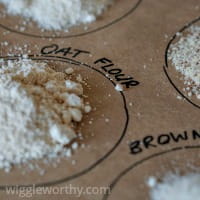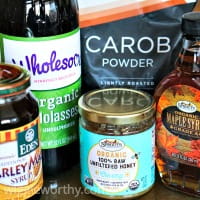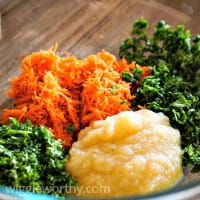Fats and Oils For Dog Treat Recipes
Fats are a necessary part of the diet, and provide essential nutrition, but there are so-called 'good' (unsaturated) fats and 'bad' (saturated) fats.
Of course it's not necessarily that simple overall and within both groups there are smaller sub-groups which can make a fat healthier, or not. Also, it's important to know that saturated fats do not appear to negatively affect the heart in dogs the same way they do in humans.
However, bottom line is that for your recipes you want to choose the fats or oils which are safe for your dog and have nutritional benefits.
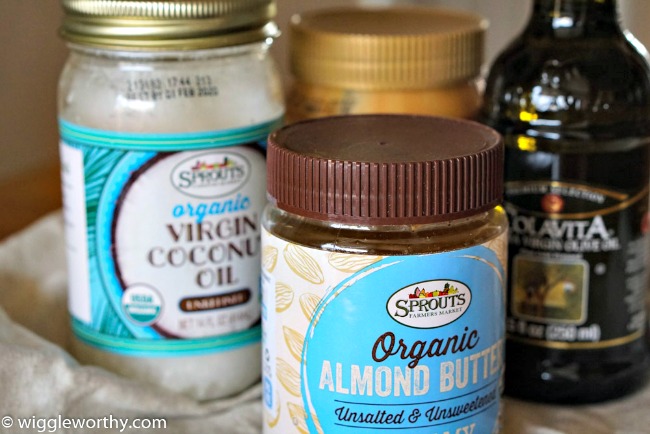
Unsaturated fats are the good ones, and these are mostly found in plant-based foods such as nuts, some seeds and some types of oils.
Some oils are rich in Omega-3 and/or Omega-6 fatty acids which are great for your dog's health.
Fish oil and flaxseed oil are great sources of these essential fatty acids (EFA's) but they're not usually a first choice for baking, luckily EFA's can also be found in other vegetable oils such as sunflower oil and olive oil.
The best fats to use in your dog food recipes include:
Peanut Butter
Peanut butter is a fantastic source of protein and contains healthy fats as well as B vitamins, vitamin E, niacin as well as iron and calcium. Most dogs absolutely LOVE the flavor or peanut butter, but, as with everything else, moderation is key!
Although peanut butter contains heart-healthy fats (that can contribute to keeping the heart and cardiovascular system functioning optimally), too much of it won't make the heart healthier. It will eventually contribute to weight gain which has the opposite effect.
The most important thing to do when choosing peanut butter for your dog treat recipes is to be sure that it doesn't contain Xylitol (an artificial sweetener which is toxic to dogs).
Warning:
Remember to double check that your peanut butter does NOT contain Xylitol. This sweetener is toxic to dogs. Peanut butter doesn't need to contain anything other than peanuts!
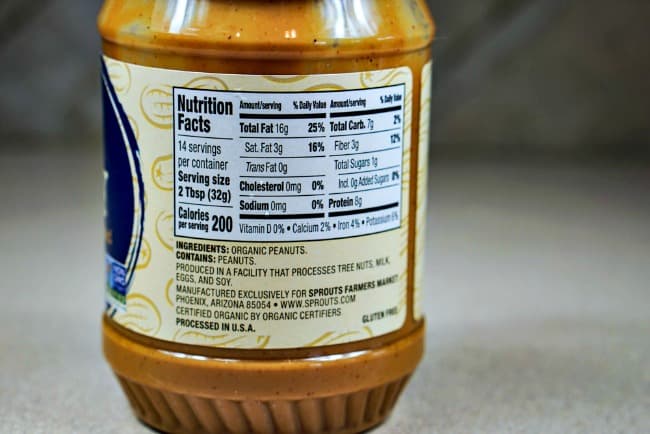
I prefer to use natural, organic peanut butter whose ingredient list states simply 'peanuts'. I think it's the best possible option.
But you can choose any peanut butter you prefer as long as you avoid Xylitol, and preferably any other added sweeteners, sugar, oils etc.
There's also a choice of texture, chunky or creamy. Dogs adore both and they work equally well in dog treats although some recipes lend themselves more to one or the other.
A third option is to use peanut butter powder, and this is a good choice for lower calorie treats or when you want to get that peanut flavor without the oil.
Almond Butter
Almond butter is about the same as peanut butter in terms of calories, but peanut butter does contain slightly more saturated fat that almond butter does. Almond butter also contains higher levels of vitamins and minerals and a little more fiber. Peanut butter is slightly higher in protein.
All in all almond butter is just as good a choice, possibly even better in some ways, than peanut butter for your dog treat recipes. You might find your dog loves almond butter as much as he loves peanut butter, in which case you can use either or both, but many dogs are not as big fans as they are of peanut butter. Only way to find out is to try it, right?
One thing I'll point out is that almond butter separates in the jar, and if it's a new jar or one you haven't used for a while then be prepared for an arm workout as you'll need to stir vigorously to blend the oil back into the 'butter'. I'd recommend using a fork for this task.
Macadamia Nuts are Poisonous to dogs
Most nuts can be made into nut butters, but that doesn't mean they're all safe for your dog to eat. Personally I prefer to stick to peanut butter and almond butter for my dog treat recipes. However, Macadamia nuts are toxic to dogs and can cause neurological damage, even death. Avoid them at all costs.
Coconut Oil
Coconut oil is made from the coconut meat, that's the white part inside the shell. Although it's actually fairly high in saturated fats but in this case they're high in medium chain triglycerides (MCT's) which the body can metabolize very quickly and effectively, and which give a whole array of nutritional benefits including an increase in metabolic rate and energy levels, improved skin and coat and digestive aid.
There are two main categories... Unrefined coconut oil (aka 'virgin' or raw/pure) and refined coconut oil, they are both made from coconut meat but the unrefined version is made from fresh and the refined from dried. Unrefined coconut oil is processed and for most manufacturers this process includes bleaching and deodorizing. The end result may contain contaminants as well as chemicals. It also loses some of the nutrients during processing. Pure coconut oil contains no chemicals, retains natural nutrients and still has a mild coconut flavor and smell. Unrefined coconut oil is either cold-pressed or expeller-pressed, both these processes basically squeeze the oil from the coconut meat, no chemicals required!
'Extra Virgin' Coconut Oil... it's not a thing!
Just FYI, if you see a label which says 'Extra Virgin Coconut Oil', it's basically meaningless! There is no formal extra-virgin classification. Coconut oil is either virgin (unrefined/raw/pure) or refined.
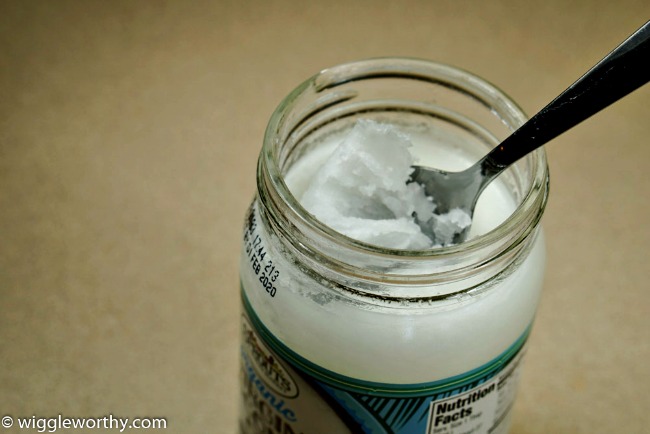
Unrefined coconut oil is solid in the refrigerator or even at room temperature which is below 75F or 76F. This means that unless it's summer and the A/C is off you will likely need to melt your coconut oil before adding it to the other ingredients in your recipes. Keeping your coconut oil in a cool, dark place like your cupboards or pantry is recommended, but even if it's in the warm and repeatedly melts and then re-crystallizes it will be fine. Coconut oil doesn't spoil easily and is generally good for about two years. Refined coconut oil can be in a liquid, or even spray form.
Sunflower Oil
Sunflower oil is made from sunflower seeds and is rich in Omega-6 fatty acids which can benefit your dog's immune system, skin, coat, heart and energy levels. It's not a strongly flavored oil and is good for cooking and baking. Sunflower oil is not a source of vitamins, minerals, fiber or protein.
Olive Oil
Olive oil is made from the flesh of olives. There are different 'grades' of olive oil, with 'Virgin' or 'Extra-Virgin' oils being the least processed and retaining the most nutrients.
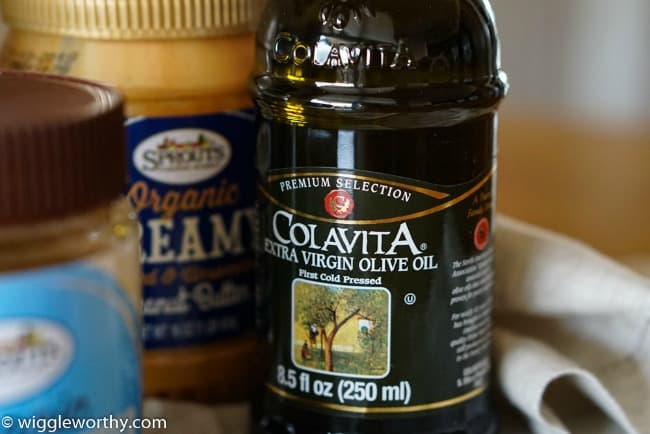
Refined olive oils are the ones which didn't make the grade for virgin, or extra-virgin status. This ranking is more to do with taste than anything else, but refined oils may chemicals or other additives and are less nutritionally complete. Olive oil can be used in all dog treat recipes, but virgin and extra-virgin varieties can have a strong, olive flavor which makes them especially good in savory treats.
Plant-based Spreads
While you can use regular butter or margarine in dog treat recipes I prefer to use plant-based spreads and 'butters'.
They are an all-around healthier option and using plant-based as opposed to dairy-based spreads helps prevent any digestive upset which might happen in dogs who are dairy sensitive.
You can get these in tubs or sticks and even whipped varieties.
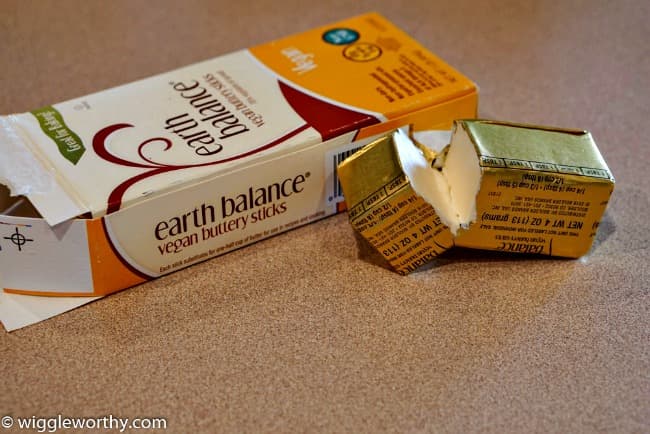
Get Fido some Essential Fatty Acids from ground Flaxseed
Flax seeds are a great source of essential fatty acids. Adding ground flaxseed to dog treat recipes is another way of getting that goodness into his diet. Whole flax seeds pass pretty much straight through your dog undigested, so using them has no nutritional benefits.
You Might Also Like These pages...
- Home
- Dog Treat Ingredients
- Fats & Oils for Dog Treat Recipes
